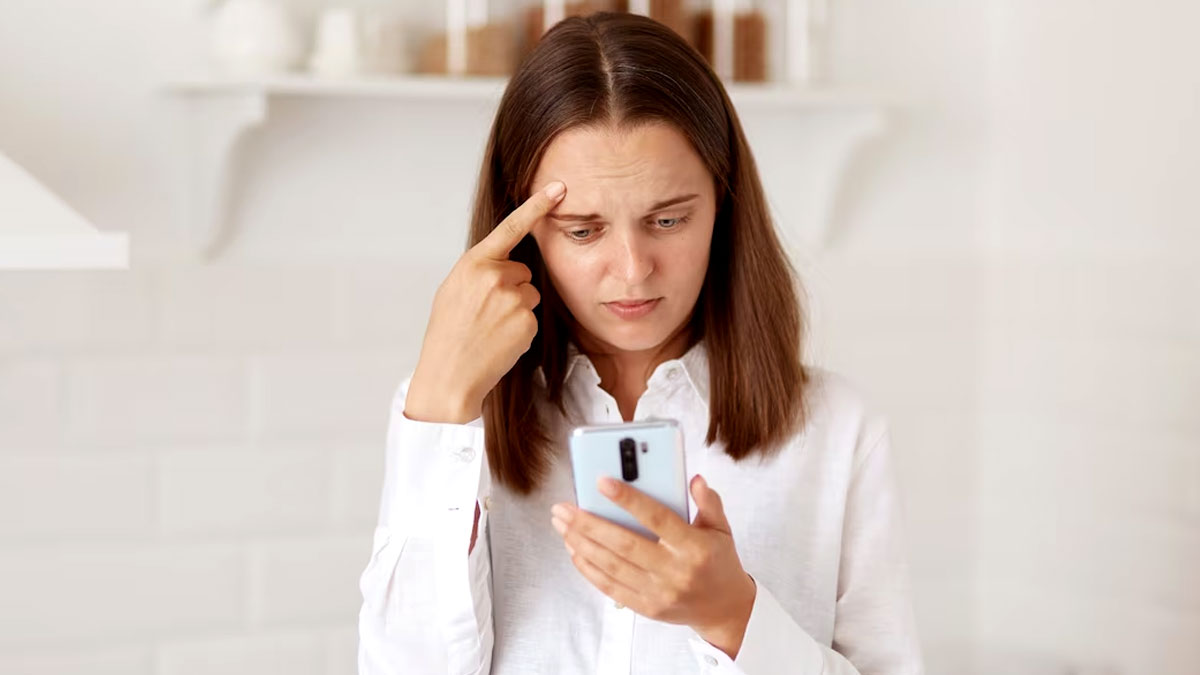

In a world where communication technology evolves at breakneck speed, the simple act of answering or making a phone call can trigger an unexpected wave of anxiety for many individuals. Phone call anxiety, a relatively common and often misunderstood phenomenon, can have a profound impact on a person’s emotional well-being and daily life.
Whether it’s the fear of awkward silence, the dread of misunderstanding, or the pressure of immediate interaction, this unyielding unease surrounding phone conversations has become a prevalent issue in today’s hyper-connected society. To know more about this issue, we spoke to Jasmeen Kaur, Licensed Clinical Psychologist (A), Member of the British Psychological Society, Formerly worked as a Consultant Mental Health for Delhi Government School Mental Health Initiative, Lead Consultant Clinical Psychologist and Founder – EHSAS Health Solutions and Services.
What is Phone Call Anxiety?
Phone call anxiety, also known as telephobia or telephonic anxiety, refers to a specific type of anxiety or fear that individuals experience when making or receiving phone calls. It is characterised by heightened levels of anxiety, apprehension, and discomfort associated with phone conversations.

Also Read: Nomophobia: Expert Explains Tips To Manage No Mobile Phobia
According to Kaur, phone call anxiety can arise in multiple situations, for example:
- Scared at the thought of making or receiving calls related to job interviews, client interactions, or important business discussions.
- Feeling anxious about calling friends or family members to catch up or make plans.
- Extremely nervous when making appointments or ordering goods or services over the phone.
Symptoms of Phone Call Anxiety
“The symptoms of phone call anxiety can vary in intensity and manifestation from person to person,” said Kaur. According to her, the common symptoms may include:
Increased Heart Rate and Palpitations
Individuals with phone call anxiety often experience a rapid heartbeat or a pounding sensation in their chest while making or receiving calls.
Sweating and Trembling
Excessive sweating and trembling hands or voice are common physical symptoms associated with phone call anxiety.
Fear of Judgment

People with phone call anxiety may worry excessively about being judged or evaluated negatively by the person on the other end of the call. This fear of judgment can lead to self-consciousness and self-doubt during phone conversations.
Avoidance Behaviour
Individuals may go to great lengths to avoid making or receiving phone calls altogether. They may intentionally screen calls, rely heavily on text messages or email, or delegate phone tasks to others.
Difficulty Initiating or Ending Calls
Phone call anxiety can make it challenging for individuals to start or conclude conversations. They may struggle with finding the right words, worry about awkward silences, or fear being misunderstood.
Overanalysing Conversations
Individuals with phone call anxiety often engage in overthinking and replaying phone conversations in their minds. They may scrutinise their words or the perceived reactions of the other person, leading to increased self-doubt and anxiety.
Generalised Anxiety Symptoms
Phone call anxiety can also be accompanied by other symptoms of anxiety, such as restlessness, irritability, difficulty concentrating, and sleep disturbances.
Also Read: Addicted To Smartphones? Learn Its Signs & Tips To Overcome It
How to Deal With Phone Call Anxiety?
“Dealing with phone call anxiety can be a gradual process, and different strategies work for different individuals. However, some strategies that can you can use to deal with it,” said Kaur.
Challenge Negative Thoughts
“Recognise and challenge the negative thoughts or assumptions that contribute to phone call anxiety. Ask yourself if your fears are based on realistic expectations or if you’re assuming the worst outcome,” said Kaur. She advised practising replacing negative thoughts with more balanced and realistic ones.
Gradual Exposure
“Gradually expose yourself to phone calls that make you anxious. Start with less challenging calls, such as calling a close friend or family member, and gradually work your way up to more challenging calls. Gradual exposure helps desensitise you to anxiety and builds confidence over time,” said Kaur.
Citing an example, she said that you can start by calling your best friend to catch up and ease into phone conversations. Then the next day try and make a call to schedule a doctor’s appointment and gradually build your confidence.
Prepare and Practice
“Preparation can help reduce anxiety. Before making an important call, make a list of points or questions you want to address,” said Kaur. She advised practising what you want to say and anticipating potential responses. “The more prepared you feel, the more confident you will be during the call,” she added.
Deep Breathing and Relaxation Techniques

“Practice deep breathing exercises or other relaxation techniques before and during phone calls to help calm your body and reduce anxiety,” said Kaur. She said that slow, deep breaths can help regulate your heart rate and promote a sense of relaxation.
“Try the following exercise next time, take a deep breath, hold your breath for five seconds, then slowly exhale. Repeat this 3-5 times and then proceed to do your task,” she explained.
Also Read: How Does Using Smartphones Right After Waking Up Impact Your Life
Use Scripts or Notes
“If you’re worried about forgetting important information or stumbling over your words, consider using scripts or notes as a guide during the call,” said the expert. “Having key points written down can provide reassurance and help you stay focused during the conversation,” she added.
Seek Support
“Talk to someone you trust about your phone call anxiety, such as a friend, family member, or therapist. Sharing your concerns can provide emotional support and potentially offer helpful advice or perspectives,” said Kaur.
Practice Assertiveness
“Learning assertiveness skills can be beneficial when dealing with phone call anxiety. Express your thoughts and needs clearly and respectfully during conversations,” said Kaur. “Remember that it’s okay to ask for clarification or additional time to gather your thoughts,” she added.
Seek Professional Help
“If a phone call anxiety significantly impacts your daily life or causes considerable distress, consider seeking help from a mental health professional. They can provide specialised guidance, strategies, and techniques tailored to your specific needs,” said Kaur.
Conclusion
Phone call anxiety can vary in severity, ranging from mild discomfort to a more debilitating condition that significantly impacts an individual’s personal and professional life. If a phone call anxiety interferes with daily functioning, it may be beneficial to seek support from a mental health professional who can provide appropriate guidance and treatment strategies.
[Disclaimer: The information provided in this article is for educational purposes only and should not be considered as a substitute for professional medical or mental health advice, diagnosis, or treatment.]
Image Credits: freepik
اكتشاف المزيد من ينبوع المعرفة
اشترك للحصول على أحدث التدوينات المرسلة إلى بريدك الإلكتروني.
